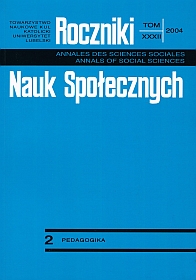Młodzież akademicka a odbiór środków społecznego przekazu
Abstrakt
The analyses based on research show a complex problem of the reception of the media by the academic youth. They focus on how the youth understand and discover the complicated phenomenon of manipulation, a phenomenon that is relatively common in the contemporary mass media.
It has been stated that the academic youth from Pêock has a very good knowledge about the media and a relatively deep insight in their manipulation. The students devote much to television, and clearly less time to the radio, and relatively little time to reading periodicals. It is a positive fact the subjects in principle adopt a conscious attitude towards the mass media and select among various media. The academic youth are well aware of the phenomenon of manipulation in the Polish media. It is especially present in television programmes.
The research and analyses prove that female students know more about manipulation. They can also give better examples of manipulation and are more sensitive to the fact of various techniques and strategies of manipulation in the Polish media. Female students decisively more often than male students notice the use of manipulation especially in television and radio programmes. They are considerably more capable of decoding the technique of suggestion, falsification of reality and ingratiation - particularly, when it comes to propagate political views and influence religious attitudes. Female students are more aware of various manipulatory suggestions and attach greater effectiveness to them, especially the strategy of deriding religious values or the sensation-music-sex strategy are used.
Analysing the relations between the type of university and the frequency of discovering manipulation in the media it has been found that students studying the humanities are better oriented in the phenomenon under consideration than technical university students. It is worth noting that in particular students from the Academy of Catholic Theology have a clearly higher level of media awareness. This is so both with regards to the knowledge about the mass media and the understanding of the essence of manipulation in the media, its application, any threats, and its negative effects.
The analyses make us postulate a further research into the media-related problems. It goes without saying that there is an urgent need to take up educative activities to incur a habit by which we know how to use the media. These activities should be taken up by such educative institutions as the family, the school, religious communities, universities, and the mass media. The point is to be educated for a proper, i.e. such that helps in a versatile development of the person, usage of the media. One should teach recipients to selective in their choice of the rich variety that the media offer, in other words to find useful and beneficial programmes. It is necessary to expose the media contents and develop intelligent attitudes among the users of the mass media. Pedagogy is obliged to form reflective attitudes towards the media, so that the recipient could recognise the beneficial aspects of the media and reject what is worthless, good for thing, stultifying, mediocre, or even harmful.
Copyright (c) 2004 Roczniki Nauk Społecznych

Utwór dostępny jest na licencji Creative Commons Uznanie autorstwa – Użycie niekomercyjne – Bez utworów zależnych 4.0 Międzynarodowe.


